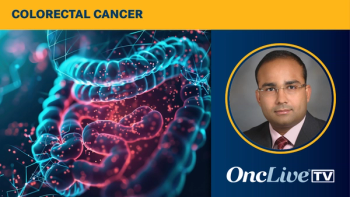
Dr. Aggarwal on Characteristics Associated With PSA PFS from the PRESTO Trial in Prostate Cancer
Rahul Aggarwal, MD, discusses the association between baseline characteristics and prostate-specific antigen progression-free survival in patients with high-risk biochemically relapsed prostate cancer from the phase 3 PRESTO trial.
Rahul Aggarwal, MD, associate director for Clinical Sciences, University of California, San Francisco (UCSF) Helen Diller Family Comprehensive Cancer Center, associate professor of hematology/oncology, UCSF, discusses the association between baseline characteristics and prostate-specific antigen (PSA) progression-free survival (PFS) in patients with high-risk biochemically relapsed prostate cancer from the phase 3 PRESTO trial (NCT03009981).
The study evaluated androgen-deprivation therapy (ADT) plus apalutamide (Erleada) with or without abiraterone acetate (Zytiga) and prednisone vs ADT alone. In a post-hoc analysis presented at the 2023 Genitourinary Cancers Symposium, findings showed that a Gleason score of 9 or 10 was associated with shorter PSA PFS following a finite duration of treatment given for biochemically recurrent prostate cancer.
Patients who have a short PSA doubling time of 9 months or less are the patients at the highest risk for development of distant metastases, Aggarwal notes. Investigators aimed to address if it was more beneficial to intensify hormone therapy or give it for a finite treatment period to prolong the time until the PSA rises once patients stop therapy, Aggarwal adds.
In the post-hoc analysis, investigators examined baseline characteristics across all 3 arms to examine what was associated with the best outcomes, Aggarwal continues. PSA doubling time is classically considered one of the strongest prognostic features; however, a baseline Gleason score of 9 or 10 was associated with shorter PSA PFS, Aggarwal says. Notably, Gleason score was obtained from a sample that was obtained, on average, 4 years before a patient entered the study, meaning that biology is still relevant to outcomes with hormone therapy in this setting, Aggarwal adds.
Conversely, investigators did not see a difference in PSA PFS with respect to PSA doubling time of less than 3 months vs 3 to 9 months, prior radiation, and the time interval from radical prostatectomy to study entry, Aggarwal concludes.



































